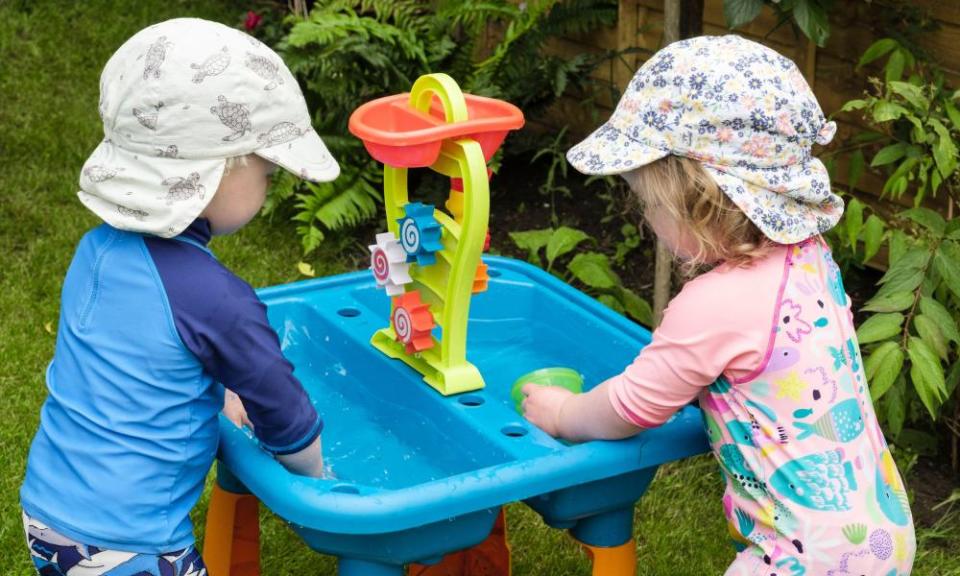Jeremy Hunt’s ‘paltry sign-up payments’ won’t stop childminder exodus

Sign-up payments for new childminders will do little to address a crisis in the sector that has seen existing professionals leaving in droves, experts say, as the number of childminders in England reaches its lowest level in a decade.
There were 28,500 childminders registered as of December 2022, according to Ofsted data, the lowest number since 2012 and 24% down from the more than 37,600 at the end of 2019.
Dwindling incomes in the midst of a cost of living crisis, rising stress levels and increasingly complex needs of families are all leading to the exodus, coupled with not enough new childminders joining the workforce to replace those leaving.
Jeremy Hunt, the chancellor, this week announced a £4bn expansion of the government’s funded childcare offer to provide an extra 30 hours a week in term time for children from the age of nine months to two years. This included the piloting of incentive payments of £600 for new childminders, rising to £1,200 for those joining through an agency.
Neil Leitch, CEO of the Early Years Alliance, welcomed the government’s recognition of the decline in childminders, but criticised “paltry sign-up payments” as “unhelpful”.
Childminders who contacted the Guardian also spoke of the prohibitively high cost of setting up, suggesting that was putting off others from joining their ranks.
“Rather than putting all their energy into attracting new childminders into the sector, ministers would do well to prioritise retaining the thousands of existing professionals who we know are leaving in their droves,” Leitch said.
Megan Jarvie, head of Coram Family and Childcare, said that while it was helpful to see recognition of the need for investment to enlarge the sector, “yesterday’s proposals will not help experienced childminders to stay”.
Childminders represent only 11% of total childcare places, according to data from the Department for Education, but are essential for parents needing flexibility and those needing wraparound after-school care.
The number of registered childminders has decreased year on year, but this has accelerated, with an annual 12% fall in 2021 and 2022.
Overall, childcare providers have fallen by 15% in three years, with almost 11,500 fewer providers registered at the end of 2022.
The number of registered places for children under seven has, however, marginally increased by 1%, from 1.5m in 2019 to 1.6 in 2022, data from the Department for Education shows. The increase has mainly come from private and voluntary providers.
The main reason for the reduction in registered childminders is that fewer are joining the sector than leaving, with only 1,500 new registrations in the year ending 31 August 2022, the lowest number of annual joiners to date.
Yok, 38, a childminder and mother of three from Welling, south-east London, will stop operating in two years, once her youngest child goes to school.
“I started childminding in 2017 because I needed to work and care for my son, it was the best option to do both. There was a heap of coursework, safeguarding and first aid [training] and getting my home insured, an interview by phone. After a five-hour Ofsted inspection of my home, I had to do another interview. It was nerve-racking, but I was over the moon when they accepted me,” she said.
“It’s lovely seeing children grow up in your care, but I struggle with late payments, your home doesn’t feel like a home because of protocols, Ofsted audits, endless paperwork and housework. Then there are the late pick-ups. The funding portal you have to use to get paid is crazy. Especially my first year was so overwhelming.”
Like Yok, many childminders took up the job because they could not afford childcare for their own children, and left when their last child started school, or were planning to do so. “When I had my firstborn, I was a manager in a restaurant; if I had put him into nursery I’d have been left with a weekly profit of only £20,” she said. “If nurseries had been cheaper, I would definitely have gone back to work instead.”
Childminders gave various reasons for having or wanting to leave, but these commonly included low pay, increasing workloads, long hours dealing with admin, Ofsted inspections, insufficient funding of the government’s “free” childcare offer and rising costs, especially for food and energy.
Tina, 40, a childminder from West Sussex, qualified less than three years ago but is now closing, as rising costs have made childminding financially unviable. “I love my job, but unfortunately the government funding is just not covering the increasing costs of all my outgoings,” she said.
Nurseries in her area that had offered the funded 15 or 30 hours of childcare, she said, were now no longer doing so to limit losses caused by underfunding.
Childminders tend to be cheaper than private and not-for-profit nurseries, although the gap has widened in recent years. In 2022, the average hourly cost of a childminder for children aged four and under was £5.30, 15% below the £6.20 hourly charge in a nursery and an increase from the 9% gap in the prices in 2018, according to data from the DfE.
Sylvia Wood, 59, a veteran childminder from Manchester, is one of many who reported huge demand for her services. Childminders are often cheaper than nurseries – even though nurseries are allowed to charge parents top-up fees for consumables and activities to make up the government’s funding shortfall.
“I’m turning people away on a weekly basis. I charge £50 a day, some nurseries here are charging upwards of £70,” she said.
An Ofsted spokesperson said that “while the requirements for training and the other regulations are set by government, we’re working hard to address some of the misconceptions we hear about the burden of inspection, and we’re also reviewing our registration process to make it more streamlined and quicker to complete”.

 Yahoo Finance
Yahoo Finance 